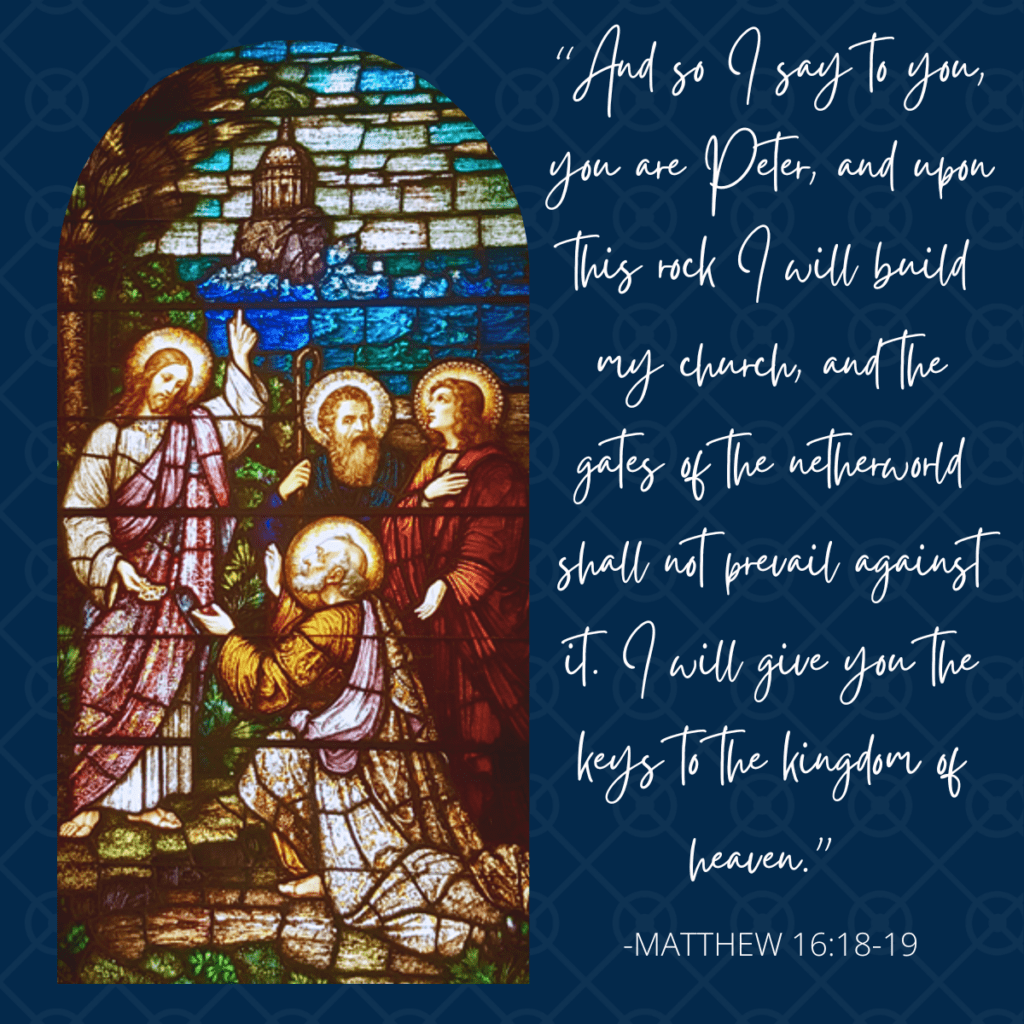Keys to the Kingdom

Dear Sisters and Brothers in Christ,
The readings from this weekend’s liturgy speak of the selection of Peter to lead the Church established by Jesus. Throughout the New Testament, Peter’s name is listed first among the apostles. It is clear from scriptural accounts that Peter was given the role of leading and unifying the early Church after Jesus returned to the Father.
The first reading from the Prophet Isaiah shows the historical precedent for the authority for the “holder of the keys” to a royal kingdom. The apostles who heard Jesus’ words about “keys to the Kingdom” would have understood the reference to the prime minister’s role in King Hezekiah’s kingdom.
We Catholics believe that Peter was the first bishop of ancient Rome and that he died there near a place which is now known as the Vatican. The authority given to Peter was for the purpose of leading and governing the Church until Jesus returns. Thus, the Catholic Church has always held that those who succeeded St. Peter in his office continue to share in the authority that was given to St. Peter by Jesus. The bishop of Rome, whom we call the Pope, serves as the vicar, or delegated representative, of Christ to govern and lead the Church.

We Catholics do not believe that the Pope is infallible in all matters. Of course, Popes can make mistakes, and often do. They can error in judgments and in actions and, like everyone, they sometimes commit sins. But we do believe that in certain specific ways and within narrowly defined parameters, the Pope does exercise what we call “papal infallibility.” That is to say that when the Pope teaches in his capacity as head of the universal Church (from the teaching office as successor of St. Peter), when such teaching concerns faith and/or morals, when it is clear that the Pope intends to teach with definitive authority irrevocably and when he intends to bind the whole Church, then we believe that the Pope is prevented by God from teaching in error.
This helps assure Catholics that we can trust in the doctrinal teachings of the Church and we trust in Jesus’ promises made to Peter, that are now exercised by Peter’s successors, the Popes.
Sincerely yours in Christ Jesus, the Way, the Truth and the Life,

Peter, the Keys, and Isaiah Chapter 22
In today’s reading from the Book of Isaiah, Chapter 22, we hear that the Lord, after removing Shebna from his position of authority, chose Eliakim, who was given the keys to the palace of King Hezekiah and made Prime Minister or vizier. Like the Egyptian vizier, a Jewish vizier was the master of the palace and the highest official in the Jewish Kingdom next only to the king. He is entrusted with the key to the palace, he controlled those who enter and leave the place. He governed the kingdom in the absence of the King.
In the Gospel from Mt. 16:19, Jesus addresses Peter in a way analogous to the ancient Jewish vizier by giving him the “keys” to God’s Kingdom. In imparting to his apostles his own power to forgive sins the Lord also gives them the authority to reconcile sinners with the Church. This ecclesial dimension of their task is expressed most notably in Christ’s solemn words to Simon Peter: “I will give you the keys of the kingdom of heaven, and whatever you bind on earth shall be bound in heaven, and whatever you loose on earth shall be loosed in heaven.” “The office of binding and loosing which was given to Peter was also assigned to the college of the apostles united to its head” (LG 22.2). The words bind and loose mean: whomever you exclude from your communion, will be excluded from communion with God; whomever you receive anew into your communion, God will welcome back into his. Reconciliation with the Church is inseparable from reconciliation with God (see Catechism 1444-1445).
The Gospel of Matthew was very explicit in showing how Jesus passed this authority to His disciples and shows how Peter occupies a special place among the apostles. After Jesus ascends to the Father, Peter is to be the leader of this living community of faith and will lead the Church that Jesus established until the Lord returns in glory, just as the prime minister in the Book of Isaiah, governed the kingdom of King Hezekiah in the king’s absence, so the office given to Peter continues to govern the Church until Jesus returns.
The bishop of Rome, whom we call the Pope, has continued this ministry of leadership and unity from the time of Peter until today.
